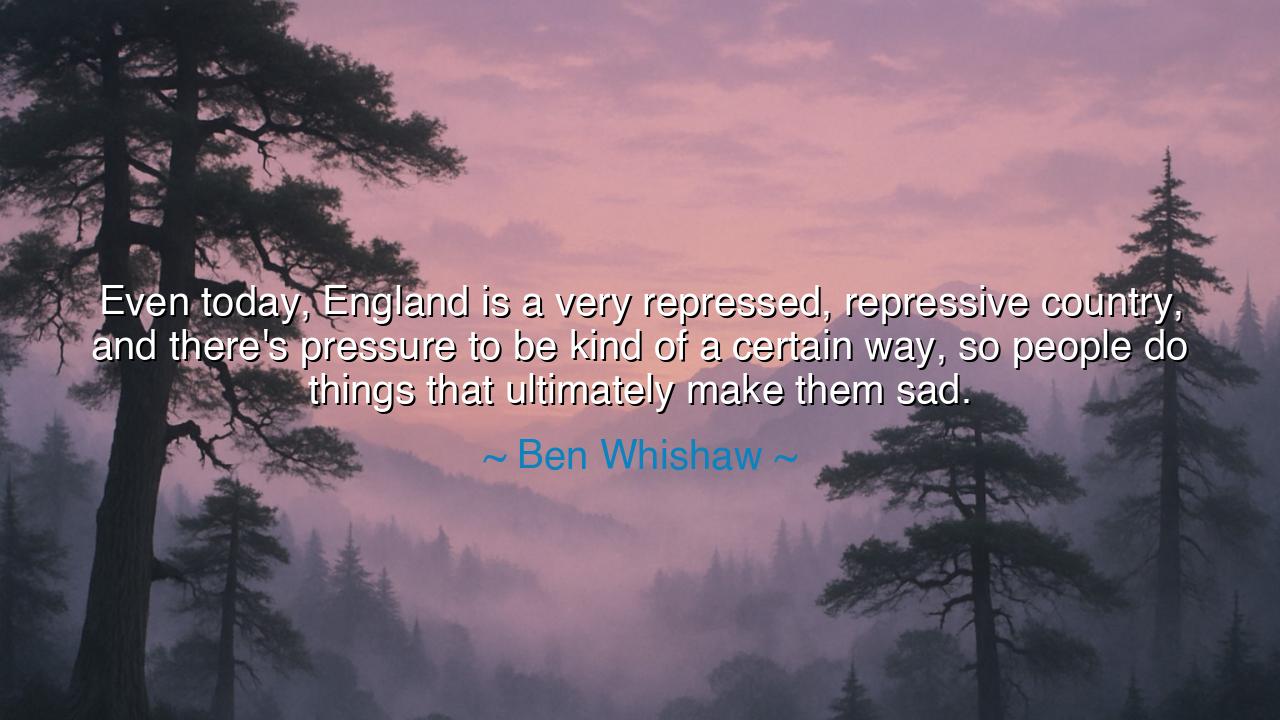
Even today, England is a very repressed, repressive country, and
Even today, England is a very repressed, repressive country, and there's pressure to be kind of a certain way, so people do things that ultimately make them sad.






Hear the words of Ben Whishaw, spoken with quiet sorrow and piercing clarity: “Even today, England is a very repressed, repressive country, and there’s pressure to be kind of a certain way, so people do things that ultimately make them sad.” In this reflection lies the cry of many souls through history: that when a society imposes too narrow a mold upon its people, the spirit bends, the heart weakens, and joy withers. His words are not only about a land, but about the eternal conflict between conformity and authenticity, between the prison of expectation and the freedom of truth.
To call a country repressed is to speak of an invisible chain. It is not soldiers at the gate nor laws inscribed in stone, but customs, silent judgments, and the heavy weight of “this is how it must be.” Repression whispers in the family home, in the schools, in the places of work, teaching men and women to smile when they are breaking, to bow when they wish to stand, to walk a road not of their own choosing. The result, as Whishaw laments, is not harmony but sorrow: people live lives that make them sad, for they live not their own lives, but the lives demanded of them.
The ancients also knew this truth. Consider the tale of Socrates in Athens, who refused to silence his questioning spirit. The city that praised freedom could not endure his defiance of tradition. They condemned him to drink the poison cup, for he would not be “a certain way.” Yet his death revealed a great lesson: that to be true to oneself may cost dearly, but to live in chains of repression is a slower death, one of the soul rather than the body. Whishaw’s lament echoes this same wisdom—that the price of imposed conformity is not unity, but spiritual decay.
History offers another mirror: the Victorian era in England, outwardly polished with manners, morality, and empire, yet inwardly wracked with secrecy, hypocrisy, and suppressed desire. Beneath the veneer of restraint lay misery, addictions, and hidden lives. Great writers such as Oscar Wilde exposed this, suffering exile and ruin because he dared to defy the dictates of what was “respectable.” The world remembers Wilde not for his silence, but for his brilliance, even though the repression of his age crushed him. Thus we see the cycle: where freedom of the heart is denied, suffering multiplies, and art itself often rises to protest.
The meaning of Whishaw’s words, then, is not only lament but warning. When we press upon others the weight of rigid expectation, we become architects of their sadness. When we ourselves bow to such pressure, we exchange the lightness of freedom for the heaviness of despair. No nation, no family, no community prospers when its people hide their truth. A society that prizes conformity above authenticity plants seeds of quiet tragedy in every home.
The lesson for us is clear: resist the chains of unnecessary repression. Do not let the judgment of others write the script of your life. Ask yourself, “Is the path I walk my own, or the one pressed upon me?” If it is the latter, be brave enough to change course. And when you see another soul burdened by expectation, offer them not judgment but freedom. Let them know it is enough to be as they are. In this way, you weaken the silent structures of repression that bind whole nations in sadness.
Therefore, let Whishaw’s lament become for us a summons. Live in such a way that your choices bring life, not sorrow. Be courageous in your truth, even if it unsettles the comfort of others. For repression builds walls, but authenticity builds bridges. If you would honor your own soul and those of generations yet unborn, break the cycle: speak, live, and act with honesty. For only in such freedom does the heart find its joy, and only in such joy can a people truly prosper.






AAdministratorAdministrator
Welcome, honored guests. Please leave a comment, we will respond soon